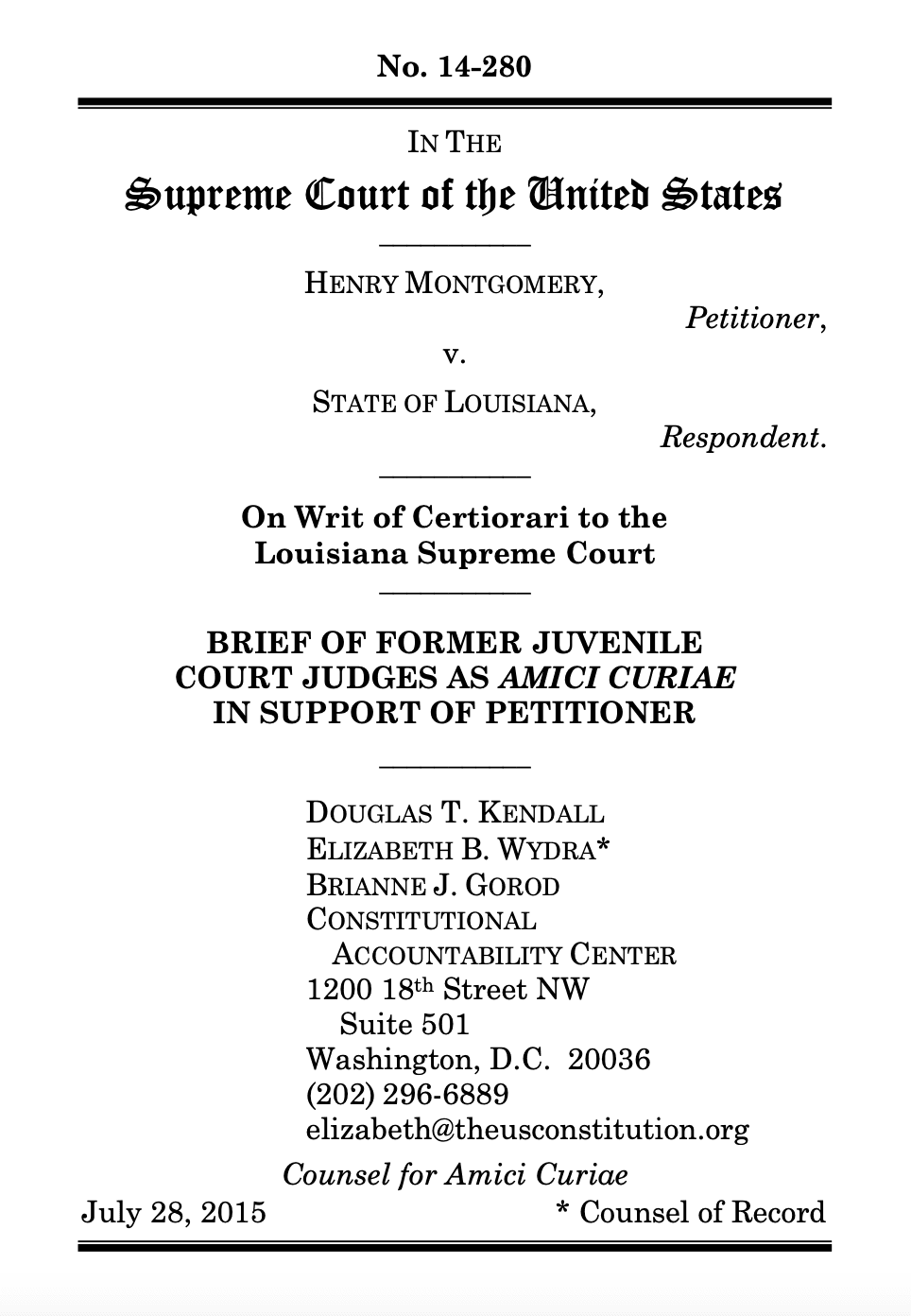
Summary of Argument
In 2012, this Court held that “mandatory life without parole for those under the age of 18 at the time of their crimes violates the Eighth Amendment’s prohibition on ‘cruel and unusual punishments.’” Miller v. Alabama, 132 S. Ct. 2455, 2460 (2012). Recognizing that “the distinctive attributes of youth diminish the penological justifications for imposing the harshest sentences on juvenile offenders, even when they commit terrible crimes,” the Court concluded that the sentence of mandatory life without parole is categorically inappropriate for juvenile offenders because it “preclude[s] a [sentencing judge] from taking account of an offender’s age and the wealth of characteristics and circumstances attendant to it.” Id. at 2465, 2467.
In 1969, Petitioner Henry Montgomery was sentenced to mandatory life imprisonment for murder. Even though Montgomery was only 17 when he committed the offense for which he received the mandatory sentence of life in prison, the Louisiana state courts held that no relief was available because this Court’s decision in Miller should not be applied retroactively to cases on collateral review.
As Petitioner demonstrates in his brief, Miller should be applied retroactively because this Court’s decisions have recognized that “[n]ew substantive rules generally apply retroactively,” Schriro v. Summerlin, 542 U.S. 348, 351 (2004), and the Court’s decision in Miller plainly announced such a new substantive rule. Among other things, Miller “deprive[d] the State of the power to impose a certain penalty,” that is, mandatory life without parole, on juvenile offenders, Penry v. Lynaugh, 492 U.S. 302, 330 (1989), abrogated on other grounds by Atkins v. Virginia, 536 U.S. 304 (2002).
As former juvenile court judges, amici appreciate the importance of Miller’s rule because they know that there are significant differences between juvenile offenders, including those who commit homicide, and adult offenders. They also know that those distinguishing features make the sentence of mandatory life without parole categorically inappropriate for juvenile offenders, as this Court held in Miller. Amici believe no juvenile should be incarcerated pursuant to an unconstitutional mandatory life without parole sentence, and they know that Miller’s new rule can be applied just as readily to cases on collateral view as to cases on direct review.
As this Court made clear in Miller, mandatory life without parole sentences are categorically inappropriate for juvenile offenders because they prevent a “sentencing authority from assessing whether the law’s harshest term of imprisonment proportionately punishes a juvenile offender.” Miller, 132 S. Ct. at 2466. Indeed, as the Court made clear, this “harshest possible penalty” will only rarely be appropriate for juvenile offenders because of a number of factors, id. at 2469, including not only the “offender’s age and the wealth of characteristics and circumstances attendant to it,” id. at 2467, but also the “possibility of rehabilitation,” id. at 2468. Indeed, the Court’s opinion in Miller reflects what amici know based on their collective decades of experience in the juvenile courts: the circumstances attendant to youth make juvenile offenders less culpable for their offenses and more susceptible to rehabilitation. Therefore, the sentence of mandatory life without parole is categorically inappropriate for this class of offenders.
Amici submit this brief to demonstrate that the criminal justice system is equipped to revisit the sentences of juvenile offenders pursuant to this Court’s decision in Miller, even when those offenders’ cases are no longer on direct review and even when a substantial amount of time has passed since the offense was committed. As not only Miller, but also lower court decisions applying Miller, make clear, many of the factors that will be most relevant for judges and parole boards assessing offenders whose crimes were committed long ago will be their age at the time of the offense and their record in prison, and those factors can readily be assessed just as easily on collateral review as on direct review.
Indeed, courts have successfully applied retroactively both Miller and this Court’s decision in Graham v. Florida, 560 U.S. 48 (2010), holding that juvenile offenders cannot be sentenced to life imprisonment without parole for non-homicide offenses. These cases make clear that there is no practical bar to applying Miller retroactively. Moreover, whatever minimal practical burden retroactive application might impose on the criminal justice system, that burden does not trump the constitutional prohibition on mandatory life without parole sentences for juvenile offenders that this Court recognized in Miller. In Miller, this Court recognized that mandatory life without parole is an unconstitutional sentence when imposed on juvenile offenders. That substantive rule should apply to all juvenile offenders, regardless of whether their case is on direct or collateral review.
In sum, Miller can be applied retroactively on collateral review, and it should be so applied. Juvenile offenders are categorically different than adult offenders; and, as this Court recognized in Miller, those differences make mandatory life without parole an unconstitutional sentence to impose on a juvenile offender. The decision of the court below should be reversed.